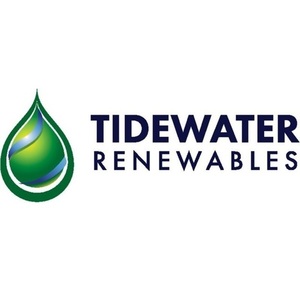Tidewater reports strong Q2 operations, progress with SAF project

August 19, 2024
BY Erin Voegele
Tidewater Renewables Ltd. on Aug. 15 reported that its biorefinery in Prince George, British Colombia, operated at near capacity during the second quarter. Work is progressing on a potential sustainable aviation fuel (SAF) project and the company is taking action to improve financial liquidity.
Tidewater CEO Jeremy Bains said the company’s renewable diesel and renewable hydrogen (HDRD) complex averaged daily throughput of 2,925 barrels per day during the second quarter, representing a 98% utilization rate.
Advertisement
During the three-month period, Tidewater made significant strides in front end engineering design (FEED) for a proposed SAF project, which the company previously said would create 6,500 barrels per day of SAF and renewable diesel capacity. According to Bains, a final investment decision is expected in 2025.
While operations at HDRD were strong during the second quarter, oversupply of biobased diesel impacted financial performance. Bains said Tidewater approached numerous counterparties at the end of the second quarter to contract British Columbia Low Carbon Fuel Standard credit sales for the third quarter but were unable to secure any commercially acceptable bids. Market prices for BC LCFS credit sales declined to $207 per credit in July, Bain added, attributing the low LCFS credit prices to a surge of subsidized U.S. renewable diesel entering the British Columbia market driven by an oversupply and overlapping U.S. and Canadiana low carbon fuel policies. With time, Bains said the company expects the temporary imbalance causing weak credit prices to revert to healthier levels for the renewable fuels industry. He cited tightening compliance obligations in California and British Columbia and the requirement for winter-spec diesel in British Columbia as factors expected to limit British Columbia imports of renewable diesel in late 2024 and early 2025.
“The current market situation has created liquidity challenges,” Bains said. “We are in discussions with the BC and federal governments to explore potential adjustments to the regulatory frameworks that will better support a domestic renewable fuels industry.”
Advertisement
Bains also outlined Tidewater’s plans to sell certain assets to increase liquidity. The company reported that Tidewater Midstream will acquire from Tidewater Renewables its canola co-processing infrastructure, the fluid catalytic cracking co-processing infrastructure, working interests in various other Prince George refinery units, and a natural gas storage facility co-located at Tidewater Midstream's Brazeau River Complex. Consideration for this related party transaction will consist of a cash payment by Tidewater Midstream of $129.7 million, and a commitment to purchase a minimum of $80.7 million for BC LCFS credits, as they are produced by Tidewater Renewables, over the next nine months, if the HDRD Complex continues to operate at over 90% utilization. This proposed transaction is expected to close in the third quarter, pending regulatory and lender approvals.
Tidewater Renewables has also entered into a definitive purchase and sale agreement with an unnamed party for the sale its used cooking oil feedstock assets for $10.5 million. That transaction is expected to close in September.
Tidewater reported net income attributable to shareholders of $4.9 million during the second quarter, compared to net income of $2.7 million during the same period of last year. EBITDA was a record $29.6 million, up 17% from the previous quarter.
Related Stories
Saipem has been awarded an EPC contract by Enilive for the expansion of the company’s biorefinery in Porto Marghera, near Venice. The project will boost total nameplate capacity and enable the production of SAF.
Global digital shipbuilder Incat Crowther announced on June 11 the company has been commissioned by Los Angeles operator Catalina Express to design a new low-emission, renewable diesel-powered passenger ferry.
International Air Transport Association has announced the release of the Sustainable Aviation Fuel (SAF) Matchmaker platform, to facilitate SAF procurement between airlines and SAF producers by matching requests for SAF supply with offers.
Alfanar on June 20 officially opened its new office in London, further reaffirming its continued investment in the U.K. The company is developing Lighthouse Green Fuels, a U.K.-based SAF project that is expected to be complete in 2029.
ATR and French SAF aggregator ATOBA Energy on June 19 signed a memorandum of understanding (MOU) to explore ways to facilitate and accelerate sustainable aviation fuel (SAF) adoption for ATR operators.
Upcoming Events










